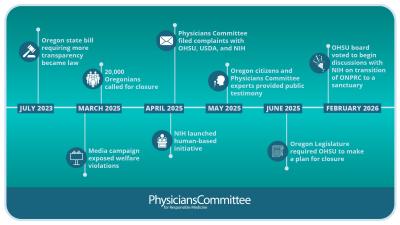Progress on Prevention: Congress and Alzheimer’s Groups Call for More Funding of Human Studies and Biobanks
Successful therapies and strategies to stem the Alzheimer's disease epidemic continue to elude scientists.
Clinical trials continue to fail, as they have for over a decade, and it is increasingly clear that we need to think about Alzheimer’s research in a different way. The Physicians Committee has called for greater use of human-based approaches as a way to improve translatability, enhance prevention strategies, and reduce health disparities in Alzheimer’s research. Congress and Alzheimer's advocacy groups agree, as evidenced by the recently-passed House Appropriations bill that funds the NIH, that research priorities must shift toward human studies on dementia prevention.
Specifically, the bill report encourages the NIH to prioritize longitudinal population-based cohort studies, research on early biomarkers, and increased support for understanding health disparities. The House Appropriations Committee also recognizes the importance of non-animal methods, such as human tissue engineering and the use of biorepositories, especially in studying the nuances of the human brain and nervous system.
The growing consensus within the Alzheimer's advocacy and research communities is that our current understanding of risk factors and focus on prevention is inadequate. More patient groups and scientists are seeing the essential role of human studies and human-based research in helping to rethink dementia. In fact, at a recent Discoveries in Alzheimer's Research event, the Alzheimer’s Association highlighted the importance of investigating demographic, psychological, lifestyle, and environmental risk factors in large-scale population studies and using human stem cells and donor brains.
Another essential part of this bill is the recognition that more must be done to eliminate the health disparities gap in dementia research. Although African Americans are twice as likely to develop Alzheimer’s when compared to non-Hispanic whites and Latinos are 1.5 times more likely to develop the disease, both of these groups are severely underrepresented in preclinical and clinical studies. The Alzheimer’s Association and Congress acknowledge the need for diverse research populations; including subjects from historically underrepresented populations is key to understanding ethnic differences in disease risk and reducing health disparities. Importantly, this much-needed research can only be conducted using human-based methods.
The Physicians Committee has been working to help the NIH shift away from animal experimentation to more predictive, human-based approaches for dementia research, including efforts through public forums and recommendations to the National Plan. Not only are human-based approaches more applicable to human health, they can begin to address health disparities by using patient-derived samples and human data in ways that are impossible with animal experiments.
Human-based studies hold key opportunities for the early detection and prevention of Alzheimer’s disease. The Physicians Committee is excited to see greater prioritization of human-based approaches in proposed legislation and within the research community to help achieve health equity.
The Physicians Committee is hosting a roundtable discussion on strategies to address health disparities in Alzheimer’s at the Alzheimer’s Association International Conference on Monday, July 15th, 2019. Contact Dr. Ann Lam at alam [at] pcrm.org (alam[at]pcrm[dot]org) for more information about this event and to register to attend.








